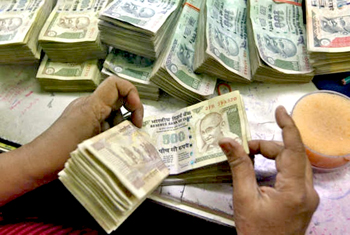New Delhi, Mar 3: In the last 10 years, the declared expenditure by political parties for the Lok Sabha elections grew over 400 percent, with BJP and Congress topping the charts in terms of capital mop-up, according to data analysed by the Association for Democratic Reforms.
Spending on publicity is driving most of the increased expenditure.

The report said that the total funds raised by these six parties grew to Rs 1,158.59 crore in 2014 Lok Sabha polls, from Rs 223.8 crore in the 2004 general elections.
“Over a period of 10 years, funds collected by national parties during Lok Sabha elections increased by 418 percent,” ADR said, while adding that funds were collected over a 75-day period from the the date of announcement of elections and the date of completion of polls.
On their expenditure, the report said that “over a period of 10 years, the expenditure incurred by national parties during Lok Sabha elections increased by 386 per cent.”
The national parties considered for the report are BJP, Congress, BSP, NCP, CPI, and CPM, it added.
These parties incurred total expenditure of Rs 2,454 crore during the last three general polls, the report said, while adding that the expenses have exceeded the amount of funds declared to be collected by them during the election period.
The main heads under which political parties declared their expenses are “publicity, travel, other/miscellaneous expenses and expenditure on candidates”.
“During Lok Sabha elections in 2004, 2009 and 2014 together national parties spent 50.58 percent of their total expenditure on publicity, 19.68 percent on travel expenses and 15.43 per cent on candidates and 14.31 per cent on other expenses,” the report said.
The national parties collectively spent Rs 661.26 crore on media advertisement, Rs 126.94 crore on public meetings and Rs 70.77 crore on publicity materials during Lok Sabha polls in 2014.
“BJP spent the maximum amount of Rs 342.36 crore on media advertisement followed by Rs 89.56 crore on public meetings and Rs 31.35 crore on publicity materials,” the report said.
“The total funds collected by national parties amounted to Rs 2,237.28 crore during Lok Sabha 2004, 2009 and 2014 elections, of which 54 per cent or Rs 1,205.92 crore was collected by cheque, while 45 per cent or Rs 1,007.81 crore was collected by cash,” it said.
With an expenditure of staggering Rs 1,263.94 crore, BJP topped the overall expenses list for the last three Lok Sabha elections. It is followed by Congress which shelled out Rs 1,015.86 crore during the same period.
These two parties were followed by NCP whose expenses touched Rs 76.4 crore, BSP (Rs 55.5 crore), CPM (Rs 26.92 crore) and CPI (Rs 15.36 crore).
Total expenditure of national parties during Lok Sabha 2014 elections increased by 49.43 per cent, to Rs 1,308.75 crore from Rs 875.81 crore during Lok Sabha 2009.
In the 2014 Lok Sabha polls, which saw the BJP coming back to power with a thumping majority, the party shelled out Rs 712.48 crore.
During last year’s general polls, Congress incurred an expenditure of Rs 486.21 crore. The least spent was made by CPM at Rs 8.8 crore.
In terms of fund collection, BJP mopped up the highest of Rs 588.45 crore for the last year’s polls, the report said.
“BJP declared the highest amount of funds collected during Lok Sabha elections, 2014. The party declared collecting Rs 588.45 crore over 75 days of election period,” it noted.
Congress declared the second highest amount of Rs 350.39 crore followed by NCP with Rs 77.85 crore and BSP with Rs 77.26 crore.
“CPI declared the least funds collected (Rs 9.52 crore) during the 75 days of election period,” the report said.
The Lok Sabha election period in 2014 was spread across 75 days.





Comments
Add new comment